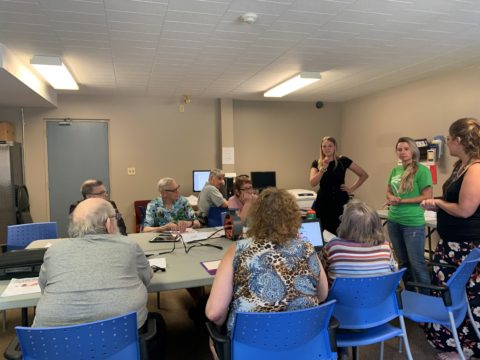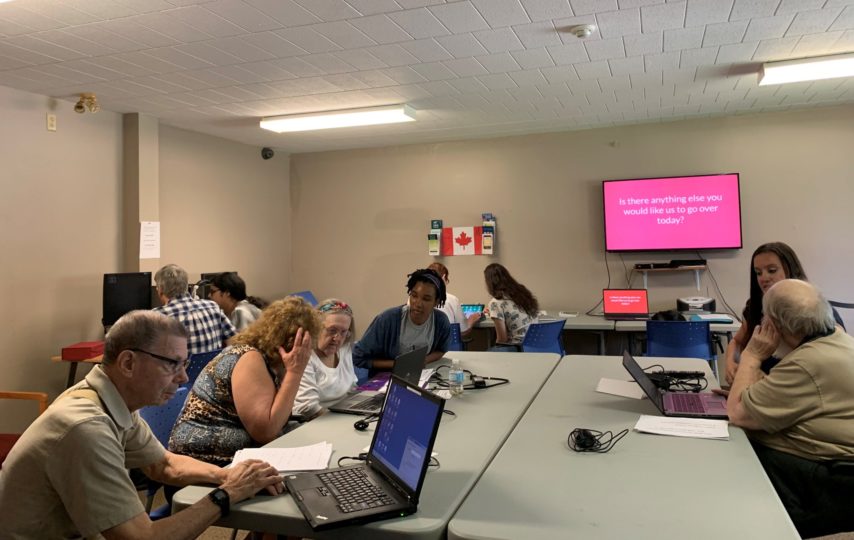Niagara College has received two grants totaling $105,000 through the Government of Canada’s Emergency Community Support Fund (ECSF). The fund, administered in collaboration with the United Way Centraide Canada, Community Foundations of Canada and the Canadian Red Cross, provides financial support to charities and other qualified organizations adapting their frontline services to support vulnerable Canadians during the COVID-19 pandemic.
The grants are a welcome boost in support of NC students experiencing food insecurities and for the College’s Recreation Therapy program that is committed to positively impacting seniors living in Niagara’s long-term care homes.
Stocking up NCSAC’s Nourishing Minds Grocery Card Program
The Niagara Community Foundation has generously awarded a $50,000 ECSF grant to the Nourishing Minds Grocery Card Program at NC to provide vital support to students facing food insecurities due to COVID-19. The program, which is run by NC’s Student Administrative Council (NCSAC), provides students in need with $50 electronic grocery cards to assist with the cost of groceries and other necessities.
Prior to COVID-19, students experiencing food insecurities were referred to Nourishing Minds by the College’s counselling services or financial aid. In response to an increased need during the pandemic, NCSAC moved its grocery card application process online to help students quickly, safely, and discreetly. Emergency funding was initially provided through community donations and a transfer of college operational funds, and since mid-March, more than 4,000 grocery cards have been distributed to students.
“Through the Government of Canada’s Emergency Community Support Fund (ECSF), the Niagara Community Foundation is proud to deploy these vital funds to our partners at Niagara College for their Nourishing Minds Grocery Card Program,” said Bryan Rose, executive director, Niagara Community Foundation. “We are all keenly aware of the negative impact that COVID-19 has had on all members of our community. Balancing tuition payments and basic necessities like rent, groceries and transportation is difficult for so many in ‘normal’ times, let alone during a pandemic. These funds will go a long way in ensuring that Niagara College students have the resources they need to keep moving forward with their education while knowing they have some help to put food on their tables.”
In addition to the ECSF grant, TD Insurance, the College’s alumni affinity partner, has generously donated $10,000 in support of the Nourishing Minds Grocery Card Program by redirecting funds that would have been earmarked for event sponsorship supporting NC.
Thanks to the recent contributions, NCSAC will be able to continue the program to provide students with grocery cards on an emergency basis, and to further the program throughout the coming year.
“The grant received through the support of the Government of Canada and the Niagara Community Foundation and the generous donation from TD Insurance, highlights the commitment our community partners have towards student well-being at Niagara College,” said Tom Price, NCSAC president. “The combined contributions will ensure the viability of the NCSAC Grocery Card initiative, allowing us to continue tackling food insecurity during these challenging times. To date, the extraordinary relationship between NCSAC, Niagara College, and our community partners has seen substantial funds redirected to the Nourishing Minds Fund since March 18, 2020.”
Support for Recreation Therapy program a win-win for students and long-term care residents
NC’s Recreation Therapy program has also received funding for its efforts in response to the COVID-19 pandemic. The United Way of Niagara has generously awarded NC with a $55,000 ECSF grant that will help cover the cost of materials for a project aimed at combating isolation and loneliness in long-term care homes.
The project will engage second-year Recreation Therapy students who will provide comfort and companionship to residents living in Niagara’s long-term care homes. Students will connect virtually with residents through one-on-one meaningful interactions to provide stimulating therapeutic activities, and cognitively and socially stimulating programs. The individualized programming works to reduce the boredom, loneliness and isolation being experienced by the residents who have been separated from their loved ones due to COVID-19 restrictions.
“Since our in-home programming had to stop as a result of the COVID-19 pandemic, this grant allows us to continue offering vital programming to residents in ways that meet public health requirements and keeps residents engaged and healthy,” said Carol Phillips, associate dean, School of Community Services. “Through the project, our students will gain an applied learning experience while supporting long-term care residents who will benefit from the connections and customized activities being provided. It’s a win-win for everyone involved.”
Students, who are trained Cyber Senior facilitators, will teach residents how to use iPads and facilitate activities that are created specifically for individual residents’ needs, abilities, and interests. Examples include asking “All About Me” questions to develop their life histories and writing letters and emails as part of a Pen Pal project or to send to family and friends.

Through their DementiAbility Methods training, students will also provide Montessori-inspired activities created specifically to provide stimulation and joy to those with dementia. Examples include asking residents to reach into a bag of knitting and sewing materials to guess the items or playing instrumental music and asking residents to guess what type of instrument was played.
Each student will interact with approximately eight residents per week during their 14-week academic term and it is anticipated that over 5,600 meaningful interactions will be provided over the course of the project.
“Supporting the well-being of seniors in long-term care homes through this pandemic is such an important issue in Niagara,” said Frances Hallworth, executive director, United Way of Niagara. “Companionship is a major contributing factor to our overall health, and seeing our loved ones in long-term care homes suffering from the effects of isolation has been difficult for everyone. United Way is pleased to be able to grant $55,000 to Niagara College’s Recreation and Therapy program in support of its ‘combating isolation and loneliness for seniors’ project thanks to the Emergency Community Support Fund.”
“We’re very grateful to the Government of Canada and our valued community partners for assisting students in need and supporting the great work of our Recreation Therapy program and our Student Administrative Council,” said Niagara College president Sean Kennedy. “This generous funding helps our passionate and dedicated faculty, staff and students respond to challenges that the COVID-19 pandemic has presented for our community.”



